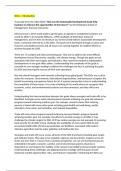Overig
SDG's introduction videos transcribed
- Instelling
- Haagse Hogeschool (HHS)
Dit document omvat alle introductie video's getranscribeerd behalve de video getiteld: 'Why are the SDG's so important for a business school?" (03:56). Het is precies getranscribeerd zodat je zelf kan highlighten voor je tentamen wat je belangrijk vindt.
[Meer zien]




